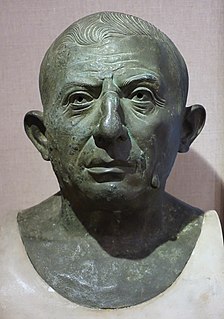Year 66 BC was a year of the pre-Julian Roman calendar. At the time it was known as the Year of the Consulship of Lepidus and Tullus. The denomination 66 BC for this year has been used since the early medieval period, when the Anno Domini calendar era became the prevalent method in Europe for naming years.

The gens Valeria was a patrician family at ancient Rome, prominent from the very beginning of the Republic to the latest period of the Empire. Publius Valerius Poplicola was one of the consuls in 509 BC, the year that saw the overthrow of the Tarquins, and the members of his family were among the most celebrated statesmen and generals at the beginning of the Republic. Over the next ten centuries, few gentes produced as many distinguished men, and at every period the name of Valerius was constantly to be found in the lists of annual magistrates, and held in the highest honour. Several of the emperors claimed descent from the Valerii, whose name they bore as part of their official nomenclature.
The gens Tullia was a family at ancient Rome, with both patrician and plebeian branches. The first of this gens to obtain the consulship was Manius Tullius Longus in 500 BC, but the most illustrious of the family was Marcus Tullius Cicero, the statesman, orator, and scholar of the first century BC. The earliest of the Tullii who appear in history were patrician, but all of the Tullii mentioned in later times were plebeian, and some of them were descended from freedmen. The English form Tully, often found in older works, especially in reference to Cicero, is now considered antiquated.

The gens Furia, originally written Fusia, and sometimes found as Fouria on coins, was one of the most ancient and noble patrician houses at Rome. Its members held the highest offices of the state throughout the period of the Roman Republic. The first of the Furii to attain the consulship was Sextus Furius in 488 BC.

The gens Marcia, occasionally written Martia, was one of the oldest and noblest houses at ancient Rome. They claimed descent from the second and fourth Roman Kings, and the first of the Marcii appearing in the history of the Republic would seem to have been patrician; but all of the families of the Marcii known in the later Republic were plebeian. The first to obtain the consulship was Gaius Marcius Rutilus in 357 BC, only a few years after the passage of the lex Licinia Sextia opened this office to the plebeians.
Lucius Julius Caesar was a Roman politician and senator who was elected consul of the Roman Republic in 64 BC. A supporter of his cousin, the Roman dictator Gaius Julius Caesar, Lucius was a key member of the senatorial coalition which strove to avoid civil war between the Roman Senate and his nephew Marcus Antonius in the aftermath of Caesar's assassination in 44 BC.
Manius Aemilius Lepidus was a Roman politician who became consul in 66 BC alongside Lucius Volcatius Tullus.
Lucius Volcatius Tullus was a Roman politician who became consul in 66 BC alongside Manius Aemilius Lepidus.
The gens Anicia was a plebeian family at ancient Rome, mentioned first towards the end of the fourth century BC. The first of the Anicii to achieve prominence under the Republic was Lucius Anicius Gallus, who conducted the war against the Illyrii during the Third Macedonian War, in 168 BC.

The gens Aufidia was a plebeian family at ancient Rome, which occurs in history from the later part of the Republic to the third century AD. The first member to obtain the consulship was Gnaeus Aufidius Orestes, in 71 BC.

The gens Caecilia was a plebeian family at ancient Rome. Members of this gens are mentioned in history as early as the fifth century BC, but the first of the Caecilii who obtained the consulship was Lucius Caecilius Metellus Denter, in 284 BC. The Caecilii Metelli were one of the most powerful families of the late Republic, from the decades before the First Punic War down to the time of Augustus.

The gens Horatia was a patrician family at ancient Rome. In legend, the gens dates back to the time of Tullus Hostilius, the third King of Rome. One of its members, Marcus Horatius Pulvillus, was consul suffectus in 509 BC, the first year of the Republic, and again in 507. The most famous of the Horatii was his nephew, Publius Horatius Cocles, who held the Sublician bridge against the army of Lars Porsena circa 508 BC.

The gens Pomponia was a plebeian family at ancient Rome. Its members appear throughout the history of the Roman Republic, and into imperial times. The first of the gens to achieve prominence was Marcus Pomponius, tribune of the plebs in 449 BC; the first who obtained the consulship was Manius Pomponius Matho in 233 BC.

Lucius Marcius Philippus was a Roman politician who was elected suffect consul in 38 BC. He was step-brother to the future emperor Augustus.
Quintus Marcius Crispus was a Roman senator and military officer who served under Julius Caesar during the civil wars of the late republic.
Lucius Vinicius was a Roman Senator who was appointed suffect consul in 33 BC.
Sextus Julius Sex. f. Sex. n. Caesar was a cousin of the Roman general Gaius Julius Caesar, and served as one of his lieutenants during the Civil War. He was killed in a revolt of the soldiers while still a young man.

The gens Nonia was a plebeian family at ancient Rome. Its members first appear in history toward the end of the Republic. The first of the Nonii to obtain the consulship was Lucius Nonius Asprenas in 36 BC. From then until the end of the fourth century, they regularly held the highest offices of the Roman state.
The gens Metilia was a minor family at ancient Rome. Although they occur throughout Roman history, and several were tribunes of the plebs, beginning in the fifth century BC, none of the Metilii attained the higher offices of the Roman state until imperial times, when several of them became consul.

The gens Munatia was a plebeian family at Rome. Members of this gens are first mentioned during the second century BC, but they did not obtain any of the higher offices of the Roman state until imperial times.